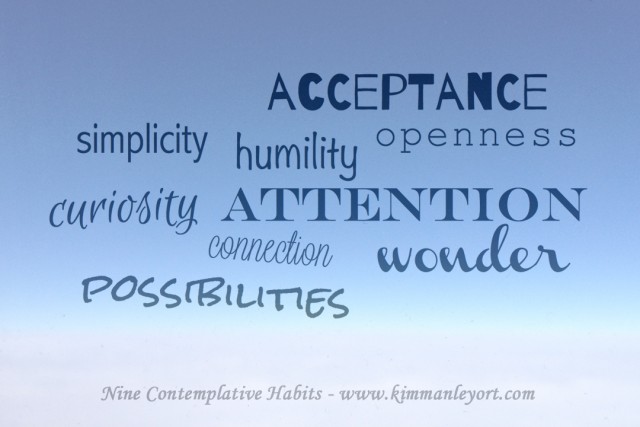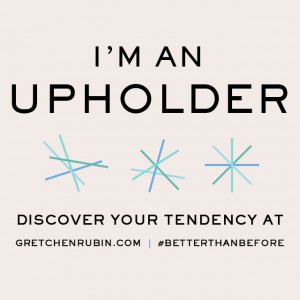
** Books mentioned have Amazon affiliate links, meaning I make a few cents if you purchase through my link. I only recommend books that I’ve read.
On this website, I talk a lot about developing contemplative habits, especially through photography. I’ve written about the book, The Power of Habit by Charles Duhigg. Habits like curiosity, openness, and humility are much more abstract than losing ten pounds. Gretchen Rubin, author of The Happiness Project, has come out with a new book called Better than Before: Mastering the Habits of our Everyday Lives.
Rubin’s book intrigues me because she discovered that how we develop a habit depends on how we handle expectations in general. She examined the existing books on habits and came up with four very different ways (or tendencies) that people respond to expectations. Knowing which of the four tendencies you lean towards determines how you should go about creating a habit.
The four tendencies: upholders, questioners, obligers, and rebels.
 * Upholders respond readily to both outer expectations and inner expectations. They don’t need deadlines or supervision; they keep themselves on track.
* Upholders respond readily to both outer expectations and inner expectations. They don’t need deadlines or supervision; they keep themselves on track.
* Questioners question all expectations, and will meet an expectation only if it’s justified, so that it becomes an inner expectation. Questioners want to know why a task should be done this way—and whether it should be done at all.
* Obligers respond readily to outer expectations but struggle to meet inner expectations. They need deadlines, late fees, supervision, and accountability partners.
* Rebels resist all expectations, outer and inner alike. They want to do a task their own way.
Via Habits Downloads. You can take the quiz here to determine which tendency you lean towards.
I am without doubt an upholder. I work best if guided by inner expectations. I don’t really like outer expectations at all, but if I agree to do something, then I will follow through.
What intrigues me is how we can apply this kind of knowledge to developing contemplative habits. For example, if we want to be more curious, how do we do it?
In my online workshop, Adventures in Seeing, I suggest the following.
1. Ask questions.
Remember your school days – who, what, when, where, why? Look at a person, thing, situation happening now in your life and ask those questions. Did you uncover anything new by looking at it from different angles? Act like a 3 year old again and drive someone crazy with your questions. They just might be flattered by your interest.
2. Don’t make assumptions.
This is one of The Four Agreements from Don Miguel Ruiz’s famous book and it has saved me on many occasions. When you notice an assumption, clarify it by asking questions. Dig deeper and uncover details you might have missed.
3. Notice your motives and reactions.
Get curious about yourself. You will get to know yourself better and not deny the parts of you that don’t always do the right thing. On the flip side, you’ll see your positive qualities as well. One of the greatest things I’ve learned is that I can’t label myself as kind, generous, peaceful, etc. I am kind (but sometimes I’m not). I am generous (but sometimes I’m not).
4. Notice your judgments and replace them with curiosity.
Take note of your judgments. How are they limiting your world? Notice especially when you are labeling something as good, bad, boring, ugly, uninteresting. Ask yourself why you consider it that way. Chances are there is no good reason.
How would upholders, questioners, obligers, and rebels work best with these practices?
For me, an upholder, I could set myself a goal of asking one good question a day, or learn one new subject or skill every week. I could write down my judgments as I notice them, and then write about how they are limiting me. As an upholder, setting an internal goal works best.
Questioners are already curious. So, maybe they don’t need to work on this habit as much as others or perhaps they could notice when their questions are actually judgments.
Obligers prefer to have external expectations so they might sign up for a course, like Adventures in Seeing, where there are structured assignments for developing curiosity. Or, they could have an accountability partner, with whom they could share what they’ve learned by being curious, or what their judgments are.
Rebels will question why curiosity even needs to be developed. They could read a book on curiosity or take a look at scientific research on curiosity and then decide for themselves.
If you take the quiz (or know immediately which type you are), please tell us in the comments which tendency you lean towards and how you best develop the curiosity habit.
I’ll be looking at the other habits as well with regard to these tendencies in future posts.
My Favourite Curiosity Links
* Lauren Bacon teaches how to ask the right questions.
* Todd Kashdan’s TED Talk on Becoming a Mad Scientist with your Life.
* The Ecstasy of Curiosity from Jason Silva at Shots of Awe
Wonderful! I too am an “Upholder”. I am so completely self-motivated. I use to joke at school that if I was told to have a report ready 6 months from now, it would be there, on-time; no need for reminders. I think this developed because I was pretty much left on my own growing up. If I wanted to achieve anything it had to be by my own efforts.
No surprise that you are an upholder too, Patricia. Blogging every day is a sure sign! Interesting the connection you made to the way you were brought up.
I want to be like you when I grow up. Wouldn’t you know that I am still a Rebel….think I might order her book. I actually think that I am in some kind of transition, but that could just be a wish….have a great day. I sit here with a smile on my face and great gratitude for you…see how many things you have pointed me to in my life. You are still a “pointer” with your words, & images. So glad my spirit recognized you immediately.
Pat
Not surprised, Pat. We need all types. Rebels and upholders are less frequent and at opposite sides of the spectrum. We can all learn from each other. I was talking to a friend yesterday about this and she said she was a questioner, which sometimes prevents her from making decisions. My response was that I sometimes need to question more the expectations I have for myself.
I’m just starting the book. Would love to know what you think of it.
As a Questioner, I wonder if we should be slotting ourselves into just the one box. I’m a Questioner by nature but also, and quite strongly, an Obliger – having some external accountability definitely helps motivate me and without it I tend to flounder. Sometimes I’m an Upholder too, although this has never come easily to me. These days, though, I’m much better at keeping myself on track without external obligations, although the ability to do this is one I’ve had to learn rather than a natural response. Very, very occasionally I’m a Rebel – usually when someone’s too emphatic about telling me what I should be doing.
However, I’m assuming that what Gretchen Rubin says – I haven’t read the book yet – is that we should identify the category that most defines us, and that has to be Questioner for me. I need good reasons for things I’m expected to do and when I was younger I didn’t do so well in subjects where the teachers refused to explain the point of what we were doing – trigonometry springs to mind here. (I still don’t understand what you do with it) My degree subject was philosophy, which attempts to answer all the really big questions – I was made to study this!
I’ve always been curious by nature and fortunately curiosity isn’t a habit I need to worry about acquiring – sometimes I think a bit less of it might be a good thing! I do annoy people sometimes, because I always want to know why, where, what, etc. and I also tend to get a bit scattered because so many things are so interesting to me. On the plus side, it takes me off on some fascinating tangents and very often I learn things that I can then bring back and relate to my main interests.
Hi Gilly, thanks so much for your in depth comment. From your response here, I would say that for sure you are a natural questioner.
I totally agree that we should not slot ourselves, although knowing which comes most naturally is valuable information. My friend who was a questioner said that she wished she were more an upholder. Yet, I said maybe I should question my own internal expectations more. I too can be a rebel and questioner at times. And, for certain habits I do need external expectations – for example, cleaning my house!
There are pluses and minuses to each. The key is knowing when our way of handling an expectation is hurting or helping us (or others).
I love this book – just finished reading my copy from the library and am now going back through taking notes. I am an Upholder as well. I found it so fascinating to recognize myself and the way I react to inner and outer expectations.